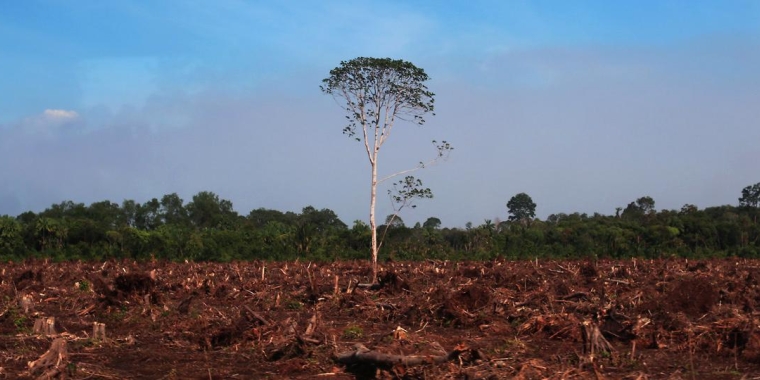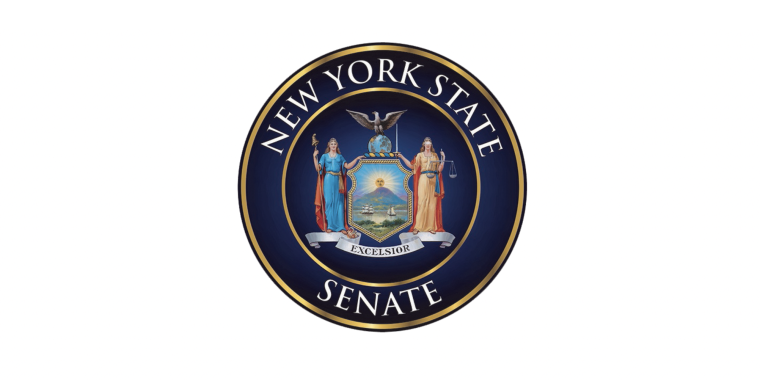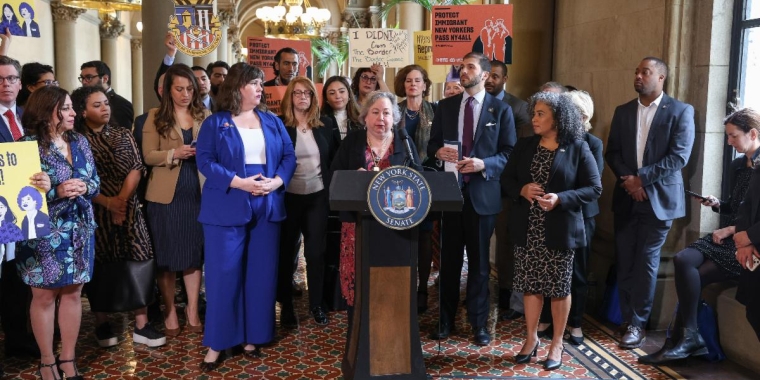
Senate Passes Tropical Deforestation-Free Procurement Act
April 25, 2023

Albany – Today, as part of a broad Earth Day bill package, the New York State Senate passed the New York Tropical Deforestation-Free Procurement Act (S.4859/A.5682), sponsored by Senator Liz Krueger. The bill would close loopholes in an existing 30-yr old ban on the use of tropical hardwoods by state agencies and municipalities, and would require state contractors whose products contain certain tropical forest-risk commodities to certify that their products are not driving deforestation. The legislation, which would also create a Supply Chain Transparency Assistance Program to help small businesses, is carried in the Assembly by Assemblyman Kenneth Zebrowski.
"The days are long past when New Yorkers can pretend that what goes on in another part of the world has no impact on us," said Senator Krueger. "The Tropical Deforestation-Free Procurement Act will ensure that New York’s taxpayer dollars are not driving the tropical deforestation that contributes to the dual crises of climate change and biodiversity loss, and the plundering of Indigenous lands across the globe. It puts New York at the forefront of a global movement to end humanity’s self-destructive level of deforestation. At the same time, we can give New York businesses a leg up on the competition by helping them clean up their supply chains. It's a win-win-win for people, planet, and New York's economy."
“Deforestation has a tremendous impact on climate change while also destroying the homes of a vast number of species," said Assemblyman Zebrowski. "New York can take a stand against this practice by closing loopholes that allow for the sale of tropical hardwood and not doing business with contractors that contribute to tropical deforestation. As the Senate passes this legislation today, I will continue to work with my colleagues in the Assembly to move this bill forward.”
Tropical forests harbor close to 50 percent of all species on Earth. Those species are now going extinct at a rate that is at least 100 to 1,000 times higher than historical levels, due to human activity. In addition, an estimated 30 percent of the world’s greenhouse gas emissions come from deforestation and forest degradation. Taking into account carbon sequestration potential, stopping the loss of tropical forests, mangroves, and wetlands could provide over 20 percent of necessary climate mitigation by 2030.
Globally, an estimated 18,000,000 acres of forest, an area more than half the size of New York State, are lost every year to deforestation according to the Food and Agriculture Organization of the United Nations, with over one-half of Earth’s tropical forests already gone. At the current pace, the entirety of Earth’s tropical rainforests will be degraded or destroyed within the next 100 years.
Loss of biodiversity resulting from forest degradation and deforestation, as well as human encroachment on formerly undisturbed ecosystems, also increases the risks of zoonotic disease pandemics such as COVID-19.
The New York Deforestation-Free Procurement Act would help to ensure that New York State government procurement does not drive tropical deforestation or degradation by tightening an existing state ban on the use of tropical hardwoods for government projects, and creating a new statute requiring state contractors who deal in forest-risk commodities to certify that their products don't drive deforestation. New York would be the first state in the nation to implement such a policy, following in the footsteps of the European Union, which recently enacted economy-wide deforestation regulations.
Many businesses throughout the United States and across the world are already increasingly engaged in efforts to ensure their supply chains are transparent, traceable, ethical, and environmentally sound, whether in reaction to consumer pressure or government regulation, or out of an understanding of corporate social responsibility. Businesses that achieve ethical and sustainable supply chains may also be able to increase their appeal with certain consumers, charge premium prices, or access previously untapped markets as a result of their efforts.
In order to remain competitive, New York businesses, particularly small and medium-sized businesses and minority- and women-owned businesses, must be able to take advantage of and stay ahead of this socially responsible and beneficial trend. The proposed Supply Chain Transparency Assistance Program, administered by Empire State Development, would be available to New York-based small and medium-sized businesses, as well as MWBEs, to help them establish more ethical and sustainable supply chains, while ensuring they have the tools they need to compete in the national and global marketplace.
Rukka Sombolinggi, secretary general of the Indigenous Peoples Alliance of the Archipelago (Indonesia), the world’s largest Indigenous Peoples organization, said: “Deforestation is not just killing trees and animals. It is also taking away Indigenous Peoples’ land, destroying livelihoods and taking lives. We need Northern governments to take actions like the New York State Senate is taking, to respect our rights and end support for deforestation.”
Jeff Conant, Senior International Forests Program Manager at Friends of the Earth, said: “We thank Senator Kruger and the rest of the New York State Senate for taking this important step toward ending the funding of climate destruction worldwide. The time has come to ensure that the commodities New York State purchases with taxpayer dollars are not exacerbating our planetary crises. A key step in meeting that goal is ensuring that the state’s purchasing protects the world’s tropical rainforests, stabilizing our climate, and maintaining global biodiversity. Equally important, the human rights violations that flow from the production of commodities like tropical lumber, cattle, soy, palm oil, and chocolate must be stopped. With this bill, New York can break this cycle of environmental and human injustice."
Marcus Sibley, Northeast director of conservation partnerships for the National Wildlife Federation, said: “New Yorkers are threatened by deadly heat waves, life-threatening storms, and severe statewide economic climate impacts driven by climate change. Making matters worse is the horrifying reality that Black people, people of color, low-income people, and Indigenous people — living both in New York and across the world — are the most impacted by these crises. Passing this bill to end New York’s funding of climate destruction is a huge victory for New York and the world. We applaud Senator Krueger, who has been tireless in her leadership on climate. The New York Tropical Deforestation-Free Procurement Act protects New Yorkers and expands justice.”
Dusan Vujovic of Tony's Chocolonely, an international chocolate company with operations in New York committed to eliminating exploitation from the cocoa supply chain, said: "Creating traceable and transparent supply chains are one of the most impactful things we can do to protect people and the planet today. Not only does supply chain transparency play a critical role in protecting our forests and enabling deforestation-free procurement, but it can also shine a light on the exploitation of people at the root of supply chains. As champions for supply chain transparency, we know the work is not easy, but we prove every day that it’s possible and so very worthwhile. We are pleased that the New York State Senate has approved the bill and hope the Assembly does so as well."
Jennifer Skene, Natural Climate Solutions Policy Manager at NRDC (Natural Resources Defense Council), said: "This bill’s passage through the Senate marks an essential step toward global accountability for the destruction of irreplaceable forests and violations of Indigenous rights. Our future is tethered to the fate of our forests and the critical role they play for the climate and biodiversity. By disentangling New York from deforestation and primary forest degradation in the tropics, this bill provides a model for marketplace transformations that can guide sustainable sourcing around the world.”
Conor Bambrick, Director of Policy for Environmental Advocates NY, said: “As the state leading the fight against climate change, it is urgent that New York makes certain that state resources are not being spent on activities and products that directly contribute to climate change—especially global deforestation. This bill ensures that products being procured by New York State are NOT contributing to the degradation or deforestation of intact tropical forests and protect our climate and indigenous populations around the world."
Liz Ahearn, Conservation Staff, Sierra Club Atlantic Chapter, said: “Deforestation is a leading contributor to climate change, and forest products procurement decisions made in New York State have implications across the globe. We must stop contributing to deforestation by halting the purchase of goods that are produced in unsustainable and exploitative supply chains. The Tropical Deforestation-Free Procurement Act is an opportunity for New York to take meaningful action to ensure that companies doing business with the State are not contributing to the loss of Earth's most vital ecosystems. This legislation will play an important role in achieving a just and sustainable future that protects forests, Indigenous rights, wildlife, and our climate.”
Tim Keating, principal consultant at Earthbilt, said: “Since the late 1980s, purchases of tropical wood by government agencies within New York State have comprised the largest end-use of rainforest-destructive hardwoods in North America. Logging these woods, and the roads bulldozed to get at them, are the largest cause of tropical forest degradation, which is the primary factor leading to deforestation. It’s long past time for New York to close the loopholes in the Tropical Timber Purchasing Act and end purchases of forest-destructive tropical hardwoods.”
Lisa Handy, Director of Forest Campaigns at the Environmental Investigation Agency (EIA) said: "EIA applauds the NY Senate for passing groundbreaking legislation to use the power of New York's markets to fight climate change and help end the destruction of the world’s last forests. This is not only good for our planet, it will ensure that NY businesses are on the cutting edge in establishing traceable, deforestation-free supply chains and provide support for small businesses that need it. We urge the state Assembly to swiftly pass the bill and Governor Hochul to sign it into law this year."
###
Share this Article or Press Release
Newsroom
Go to NewsroomLegislature Passes Bill Banning New For-Profit Hospices
April 9, 2025


Senator Krueger's March 2025 Update
March 28, 2025
